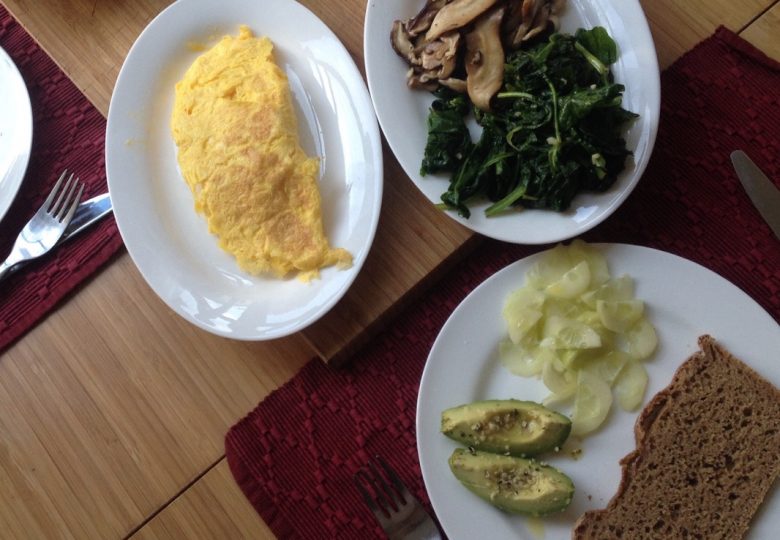Balanced breakfasts for steady energy

This article is not about whether or not to have breakfast. It is clear that everybody is biochemically individual and has different metabolic needs, with some people not needing any breakfast at all and some thriving on intermittent fasting. This article is only meant to offer alternatives for a classical, sugar-loaden, continental breakfast.
Are you one of those who run out of home with an empty stomach, grabbing a coffee and croissant on the go? Or do you maybe have a bowl of cereals or a toast with jam, with an orange juice (and coffee)? In all these cases you might find that your energy crashes later in the day, either still before lunch (so that you need to take a cookie and another coffee to get there) or after lunch.
The reason is that already with your first meal in the morning you push your blood sugar and your adrenal glands very hard by ingesting mainly sugar and caffeine (yes, even the “healthy” orange juice is looaaaded with sugar – even if it’s “natural” sugar), setting them on a roller-coaster, which will eventually crash, leaving you tired and craving more coffee or sweets. After a night of fasting, your body needs a balance of good fats, proteins and slow carbohydrates, that will replenish and nourish you AND allow to keep your energy steady throughout the day.
Even if you are short on time, there are a few ideas that are still quick & easy (and tasty), yet will also do your body good.
For most people, esp. women, a WARM breakfast is much better than a cold one. Eating hearty/salty is usually also better for lasting energy than eating sweet. Depending on your appetite in the morning, you can pick one or combine several of the provided options (e.g. a shake with a pancake or soup with bread + butter)
- Soup made with home-made bone broth, vegetables (starchy and non-starchy), coconut milk or butter, herbs and spices. Add seeds, meat (i.e. chicken, minced beef or lamb), lentils, oats or a cooked grain (i.e. rice or quinoa) for additional nutrition, satiation and variation. Or add 1-2 slices of sourdough bread with butter, ham or raw cheese.
- Beans combined with vegetables, oil and maybe an additional protein and/or an additional whole grain. You can prepare this for several days in advance and then simply warm it up.
- Traditional sourdough bread (rye, spelt, Einkorn, buckwheat) or gluten-free crackers with butter, ham, smoked fish, eggs, avocado or raw cheese, plus cup of broth (in the weekend, add spinach, mushrooms and bacon for a delicious brunch)
- Pancakes or muffins made with nut flours or gluten-free flours / flakes (+ eggs or flax/chia as egg replacement – according to your needs, google for sugar-free, gluten-free, egg-free, dairy-free recipes online or simply mix 2 eggs with 4 tablespoons of flour/flakes and bake in pan). You can prepare them in advance and freeze.
- Burgers from any combination of legumes + grains + flax seeds (or eggs) + veggies. Eat pure or with some raw cheese / ham + broth. You can prepare them in advance and freeze.
- Meat Balls served with steamed vegetables, a potato and olive oil or butter. For variation, you can use different types of ground meat (beef, lamb, poultry), different spices (sambal, herbs of Provence, lemongrass, Italian herbs…), add desiccated coconut or bread crumbs, an egg and even some pureed chicken liver for additional nutrients!
- Protein-Shakes / smoothies: NOOOO, I am not talking about those sugar loaden juices or fruit smoothies you can get at certain juice bars. I am talking about a home-made smoothie, based on good fats (e.g. coconut, almond, hemp, chia, avocado, butter, whole raw milk…), protein (non-denatured whey protein, hemp protein, gelatin, raw milk, bee pollen…) and SOME carbs (1/2 banana, some berries, 1/2 apple, 1 teaspoon of honey…). You can obviously be as creative as you want, adding lots of green veggies to it, cacao powder, wheat grass…).
- Eggs, e.g. omelet or scrambled eggs with veggies (e.g. spinach, mushrooms and/or green beans), ham or bacon, raw cheese, bread + butter
- Yogurt with nuts, fruit, cinnamon, protein powder (not recommended in winter)
- Porridge: better than cold cereal, not only because it is warm (I don’t know about you, but the classical yogurt, fruit, muesli combination leaves me feeling horribly cold), but also because you can soak it overnight (which helps digestion) and combine it with good proteins (i.e. mix it with an egg, add yogurt, or a high quality protein powder as mentioned above) and fats (e.g. coconut milk or oil, or a piece of butter, some almonds…) rather than having it with pasteurized milk.
- Chia pudding: adding chia seeds, goji berries and optionally some chestnut flakes to coconut milk, almond milk or natural yogurt and letting them soak for 20 min (or overnight)
- A dinner or lunch from yesterday (something I do quite regularly, in fact all my meals are interchangeable…)
Instead of coffee, try the following:
- Rooibos tea or other herbal tea
- Pure cacao or carob powder (I blend it with hot water, a teaspoon of butter, some cinnamon, 1/2 teaspoon of honey and some gelatin powder into a healthy, balanced, creamy drink)
- Green tea
- Fresh ginger-cinnamon tea
- Roasted dandelion “coffee”
- Golden Milk
- Bone broth (not kidding – it’s amazing!)
Give any of those a try for a week and see what happens to your energy and well-being throughout the day! Let me know in the comments!
